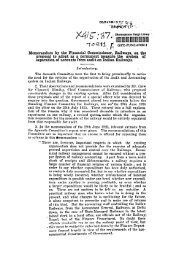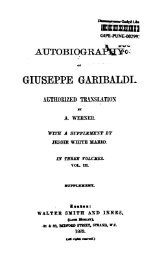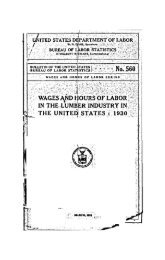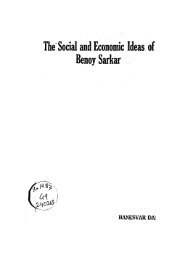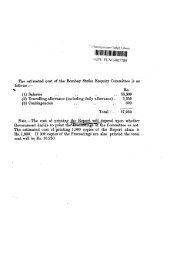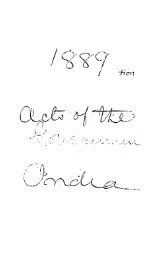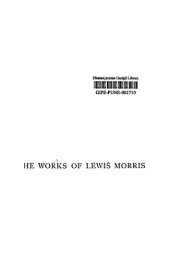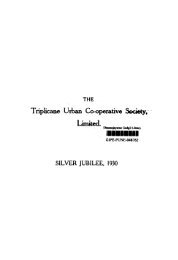You also want an ePaper? Increase the reach of your titles
YUMPU automatically turns print PDFs into web optimized ePapers that Google loves.
Guiana, and few less developed owing to the lack of<br />
capital and population. He was glad to think that<br />
the ~overnkent and the peopl~ ot Illdla were 1)(':<br />
comin~, aware of. the fact that British Guiana<br />
provided a favourable opening for, Indians of all<br />
classes, free trom t,he political dlfficu ltles and<br />
objections which stood m the way ot emlgratlon to<br />
other parts of the Empire. LJeut Colunel Amery<br />
said he understood that the Governm~mt of IndIa<br />
were making a final investlgatlOn. Lhrongh a<br />
CommlsSlOner, into the prospecttl for Indians. He<br />
cxpressd the hop8- that the ontcome would be a<br />
steady flow of settlers, and a marked stimulus In<br />
the development of the Colony, in which he antlCipated<br />
a great development m Rugal' production and<br />
the ncc Cl'Op. The developlUg of the remarkable<br />
diamond discoverles might led,t to oLh,)]' !levelopments.<br />
.<br />
In the CouncIl of State I"ord Rawlmson, Commal1der-ll1-Chief<br />
of the Indian Army, accepted an<br />
Indlan mqtlOn nrging the British GovernIllent to<br />
remove the bar against the admission of IndIail<br />
student.'1 to the UniverSity O/fi{)er's Trallling Corps<br />
says a Renter's IJlOS8ai:le from DelhI. Thp b.lr was<br />
adopted by the ImperIal Parliament recently UII tho<br />
recommendations of the Lytton Committee.<br />
A prominent missionary m ClIina has infor'med<br />
Reuter "that the mihtary authoritieS in Fnkien are<br />
compeUillg farmers to grow opium. One thousanu<br />
nve huudred Christian families refused, and 200<br />
head of tamili(>s have b~en beheaded." Who says<br />
barbarIc days are over' They seem to us to h(' jusl<br />
beginning.<br />
The New Leader (London) While referring to the<br />
work of the tabour Party III the New ParlIament<br />
admits the fact "that the Lsbour Government dId<br />
nothiI1g eftective for Indian SPlf-government or<br />
even for the protection of Indian workers"<br />
"Even 1f It were to mean," prot:eeds the Journal,<br />
"a iJostponement of our return to office, we should<br />
disl'npate the belif'f which our inaction may have<br />
tostercd that we are sound Impenalists as other<br />
palties are." The jonrual advises the Jndipendent<br />
LaboltI' Party fo concentrate all its efforts ~n India,<br />
which it characterises as the "gravest of all OUr<br />
Imperial problems"<br />
A Laboul' Women's Conference recently held In<br />
England passed tIle tollowing resolutlOn on India's<br />
claIm to Home Ilule -That the Conference expresses<br />
the ho~e that the Government will support<br />
any turther legl!1lation in order to 'secure for the<br />
people of India the same measure of selt-Government<br />
whICh is m operation m Canada, Austraha,<br />
aml South Africa.<br />
It iii reported 1Il the recent exchanges fl'om IndIa<br />
that Mr C. R. Das has made over all hiS prO"lert18s<br />
includmg hiS present residence to a board of tJ'lIstees.<br />
The whole ebtate is to be utlhsed for charitable and<br />
philanthropic purposes after paymg off hIS (lebts<br />
Sf'cured and nnElecured Among the prmClpal<br />
purposes for which the estate IS to be tlsefl IS included<br />
the establishment of a college 101' Indian women,<br />
religlOllEi education for Rmdu boys, etc.<br />
Every Indian cannot but view WIth the greatC'tlt<br />
admnalton the great sacrifice MI. C. R. Das has<br />
made lor the sake of his country and his people<br />
Few such examples as so nobly set by Mr. C. R. Das<br />
aro to llO f\(,pn in thl' prf1st'nt t'lfisll world.<br />
INDIA:N Ol'JN ION<br />
------------------<br />
January 30th, I9~S<br />
THE ASIATlfJ PROBLEM<br />
\\ AVE reprqduce in ano)ther colnlUll all al'tHllr<br />
\1.\1 appearing in the Natal .\rel'( ttl!J Imder the<br />
nom de plnme " Townsman" on the Asiatic<br />
questlOn wherein the Writer makes SOIlle ~mggeshons<br />
as to the solutlOll of thiS burnmg qu('shon<br />
Everyone is anxIOUs to see thiS problem solved once<br />
and fo!' all and any suggestions towards that directIon,<br />
are naturally welcomed. Of cours(', a great deal ot<br />
vltuperabou lR indulged 111 by anti-ASiatICs but they<br />
hardly come fOI war,l "lth S0111(; senslblr Emggestions<br />
which woulu be worth consldel'lng. The writer<br />
of the artIcle in questlOll seems to have maue a<br />
study ot the ASiatic question an!l he deserves ('reuit<br />
for the attempt he has ma.de at suggestmg :.1. solution<br />
In our opinioll, howevet·, his suggestions are llighly<br />
selfish and narrowminded.<br />
TIlt' writer admits that the Indldll lahonrer has<br />
plaYE'd no inconSiderable part III the development 01<br />
the; various mdustries o± tIllS country He has<br />
nothmg ag,uns~ the IndlJ.n, " J,S a l,tboUler pure nu(l<br />
Simple. "<br />
He IS agamL the''' Arab trader" who, he ~ays,<br />
" had no partin the development of the muustry, but<br />
simply came along and b3,ttened on it." Then h~<br />
complainR of the competItion of the Indian WIth the<br />
European bemg unfair and" that because of hiS 1Ilfenor<br />
scale of living, IH'C8tlSltating much lowe I' expenditure,<br />
the Indian can sell his goods and labom'<br />
~,t a much lower rate than his European competitor."<br />
Now III Buggestll1g a solution the WrIteI' says,<br />
., consideratIOn of the question must be fair to all<br />
partIes." The presence of the Indtan labourer, he<br />
thmks, IS shU necossary but not tlO with the Asiatic<br />
trader, who, he sug~estfi, ShOlllrl be reasonahly compeIlBated<br />
and" he must go at all costs. "<br />
The bIggest stumbling block III the way of a<br />
settlement of this problem, howclver, appears to him<br />
in the question of the Natal-horn Indian. He<br />
admits, he eannot be depo~·ted. Bllt With regard<br />
to him he suggests, that he could be dealt With<br />
along ecouGmic lllles by forcing' hIm to adopt a<br />
hIgher standard of hvmg; but this, he says, ,. IS<br />
about as far as we can go" and suggests that It he<br />
witlhes to be repatrmted so much the better but<br />
that, if he deSires to stay 111 South Africa he must<br />
be compensated and then segregated'<br />
This is the solutIOn the Wl'lter of the article in<br />
([UesiLOn_ suggests and ad vises the legHliators not to<br />
tmker with the subject any longer but to take this<br />
drastIC measure and, "like all dl':1StlC measures,"<br />
he says, " there IllllSt be some degree of untmrness,<br />
bnt With the reasonable compensatIOn Pl'oposed the<br />
bItter pIll will be made more palatable" If this<br />
step IS not immediately t,£lken. the writer Sees war in<br />
the near future with the" yellow hords 1" He dreams<br />
of a white Sunny ~outh AfrICa and asks his fellowmen<br />
to be np and domg' towards the reahsatio~ 01:<br />
that dream.<br />
Well, we do think this IS but a pOOl' solutlOll of<br />
thIS great question Sem3e of justice and eqmty<br />
does not come in it at all. The writer IS not fust<br />
even to those born in thiS country whose only home,<br />
he admits, IS her('; and yet he would keep even them<br />
lD servile conditions. The complamt of the writer<br />
that the Indian trader had corne and Simply<br />
battl'l1f'rl Oil thp mdnRt.ry of thIS C011l1try IS not ilt all



